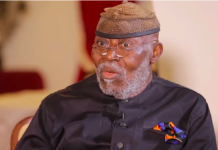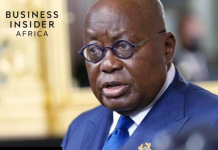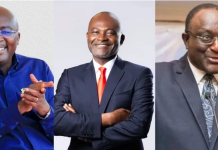Former President John Dramani Mahama has listed thirteen solutions for the government led by President Nana Addo Dankwa Akufo-Addo to resolve the economic challenges in the country.
Mahama addressing the nation on the theme ‘Ghana At A Crossroads’ on Monday, May 2, 2022, said beyond the economic mismanagement, hardships, unemployment, and other forms of misrule exhibited by the NPP government, Ghana is deeply worrying issues of high-handedness, intolerance for criticism and outright abuse of the rights of citizens deemed to be critical of the government.
He listed 13 alternatives for the government to change the economic crisis.
Mahama has urged President Nana Addo Dankwa Akufo-Addo to sack the Minister of Finance, Ken Ofori-Atta for plunging Ghana into an economic crisis. He urged the government to dissolve the current economic management team headed by Vice President Dr. Mahamudu Bawumis and reconstitute a new one to help bring economic respite to Ghanaians. He urged the President to as a matter of urgency reshuffle his cabinet.
More than 5 years of administration without a major cabinet reshuffle has calcified the management of the Ministries, departments, and agencies. These MDAs and SOEs have become fiefdoms in which untouchable Ministers and heads of agencies are now monarchs of all they survey.
Mahama said the seriousness of the economic meltdown must compel the government to unveil a clear and workable cause of action, emanating from broad-based thinking and consultation, rather than its current state of denial and wrong causal attributions. Such broad consultation must lead to a Post-COVID Economic Recovery Plan.
A programme that will focus our energies on building an economy whose fruits of growth will benefit all Ghanaians and give everyone a fair chance at success.
There must be a clear and measurable reduction in government expenditure. Even though this is not an easy cause of action, it is a necessary one, nonetheless.
I will be the first to admit after running the economy on zero percent, 0%, Central bank financing in 2016.
He said the government must drastically cut and trim down its size, rationalise and bring to reasonable levels, the pay packages of CEOs of SOEs, other senior public servants, and heads of state organisations.
He also urged the government to limit borrowing significantly.
If we all agree we are in an economic abyss, submerged under the suffocating weight of unsustainably high levels of debt, and are at risk of default, then the wise thing to do is to limit borrowing.
The government must adequately signal to the international finance providers a clear effort at meeting future obligations and the government must commit to using some of the windfalls that we earned from the rising crude oil prices to revitalise the sinking fund in anticipation of future debt servicing.
The government must also take immediate steps to restore credibility to the management of the economy. A contributing factor to the plummeting of investor confidence in our economy is the practice of underreporting and concealment of key economic indices like the budget deficit, public debt, and net international reserves.
In addition, the government must clarify reports which are rife in the investment community that it intends to use the Heritage Fund as collateral to raise a $ 2 billion loan from a consortium of banks.
It is obvious that the assumptions underlying the projections in the 2022 budget, especially regarding revenue are overambitious and are unlikely to be achieved considering all that has transpired since the presentation of the budget.
He charged the government to revert to more realistic targets and avoid creating further doubts in the minds of investors.
He said it is time to change the structure of our economy by allowing Ghanaians to achieve the popular General Acheampong mantra of “capturing the commanding heights of our economy.”
We must increase the GNP of our country as a share of our GDP. We must leverage our comparative advantage in agriculture by investing in agribusiness to complete the agriculture value chain in respect of the marketing and processing of our agricultural products.
Source: TheBBCghana.Com


















